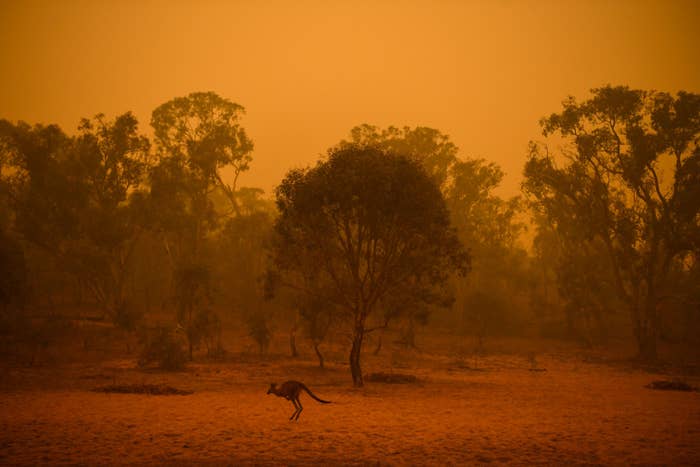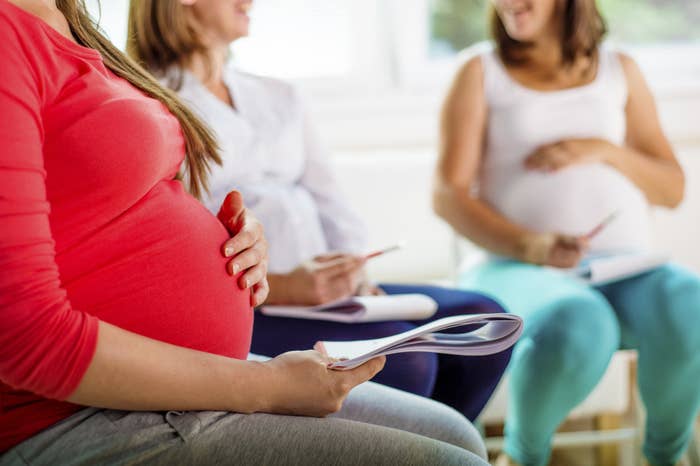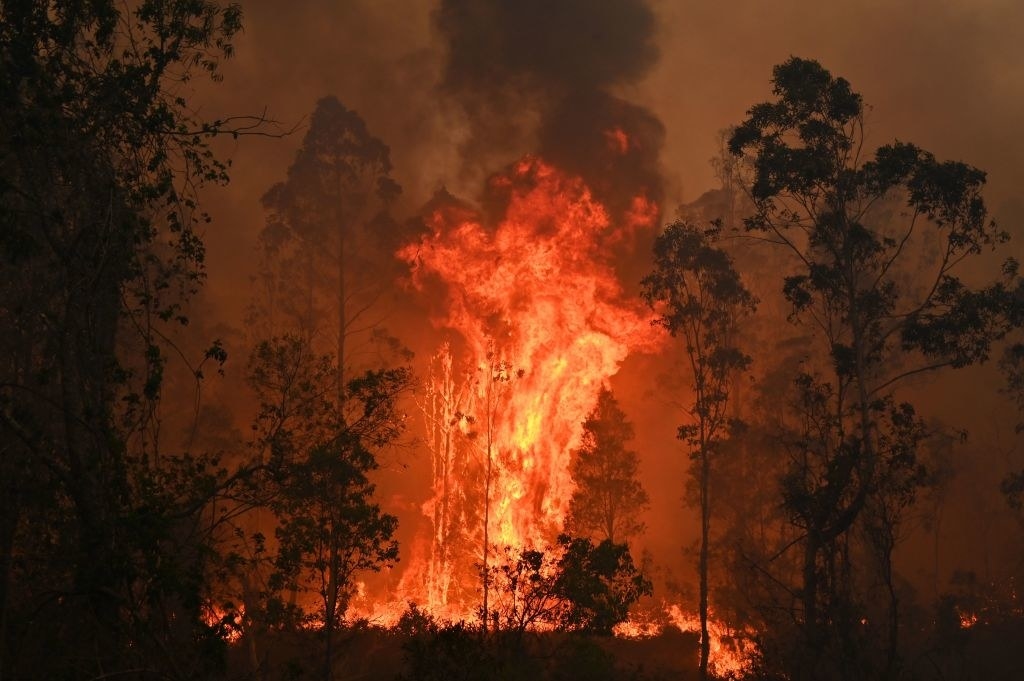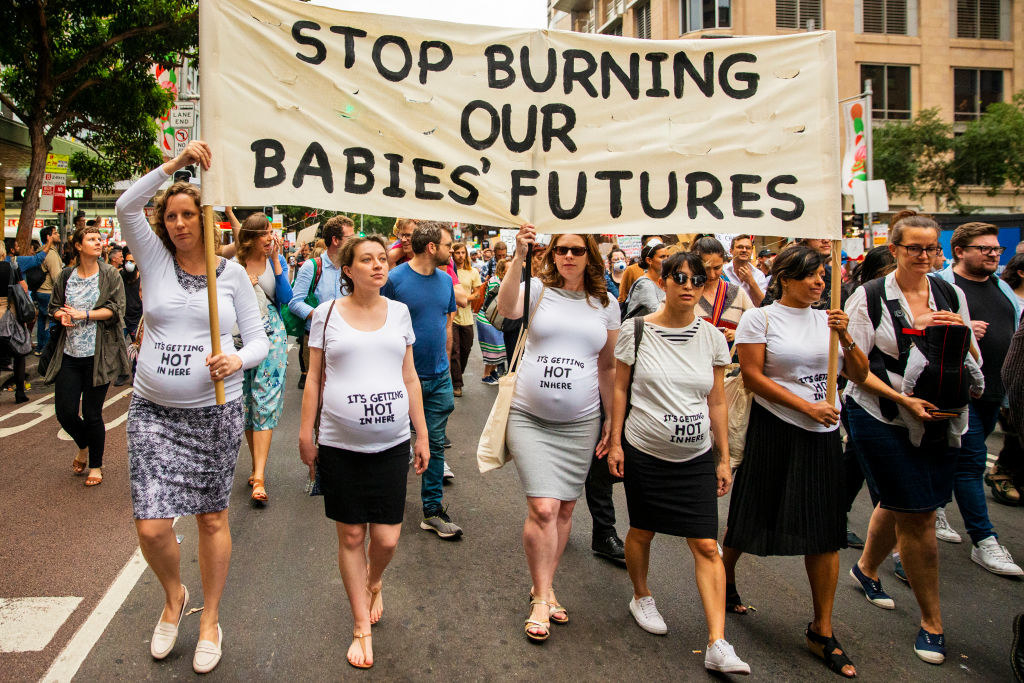
Kai Hodgkin is a midwife in Canberra, where the air has become some of the most polluted in the world during Australia’s ongoing catastrophic bushfire season. Staff at the hospital where she works have this week been wearing face masks indoors, to protect themselves against the smoke creeping into the wards and even into birthing suites.
“We were giving masks to everyone who has left us and sending these brand new parents and babies out into the smoke,” Hodgkin told BuzzFeed News.
Hodgkin runs antenatal classes that are structured so there is always time for a chat, during which conversations about climate change are now unavoidable.
“It has absolutely floored me several times when the discussion has gone towards the future and climate change and people are just asking ‘What is going to be the impact on our children?’"
Hodgkin, also a mother of two, said these conversations have been particularly desperate over the past few weeks as bushfires ravage much of the country.
“I’ve heard from people specifically saying they would like to have more children but they’re not going to because of overpopulation,” Hodgkin said. “When did the fate of the world become the responsibility of our personal fertility choices?”
Pregnant women in their second trimester have been calling up the hospital and asking for certificates to give to airlines to say they can fly so they can get out of Canberra and away from the smoke, she said.
“We’ve also had people calling up and saying: ‘Can I have an induction early because I’m worried about breathing in all this smoke?’”

Melbourne obstetrician Nisha Khot said she has also had pregnant patients "close to delivery" who have asked about whether they should induce labor due to the bushfire smoke.
"They're asking 'Is my baby safer inside or outside of me right now?'," Khot told BuzzFeed News. "I am still going on the clinical situation and if there is no clinical reason for the baby to be born early then we won't induce based on the smoke alone."
Khot said her patients have been wearing masks and using air purifiers but there aren't many options for masks for newborn babies.
Khot said even in Melbourne, which hasn't been as smoky as other capital cities, pregnant women have been asking about the implications of bushfire smoke inhalation for their pregnancy.
"They're asking 'What does this mean for my baby's growth?' and 'Do I need extra ultrasounds?' and I have to say 'I can ultrasound scan but it won't pick up any effect of the bushfire smoke that may or may not occur because there isn't a test that picks that up," Khot said. "Those are the difficult conversations."

Dr Justin Low is the lead vasectomist at Australia's biggest vasectomy provider, Marie Stopes Australia and says there have always been patients who come in and say they have "never had any desire" to have kids.
But in the last five years Low, who performs more than 1,000 vasectomies each year, said he has seen more patients who will talk more about sustainability or climate change, saying things like "there are clearly enough kids in the world and I don't want to add to that".
"We have seen more men that question whether it is sustainable at the moment to brings kids into the world and some of them might plan to foster or adopt," he said.
Among this group of patients, the sentiment is split evenly between those who don't want to add to the population and those who are anxious about giving their kids an unsure future.
Low says over the past 5 to 10 years he has also noticed a slight increase in the number of childless men presenting for a vasectomy. The provider now offers independent counselling for men, "particularly if they are in their 20s because we know from the studies they have a higher rate of regret".
"We want to respect their autonomy and decision-making but we make sure they know you can't always just get a reversal later and we let them know about sperm banking which can be a great option."

Hobart based consultant obstetrician Dr Kristine Barnden’s job involves performing ultrasound scans and visiting women in antenatal clinics, with a focus on patients with complicated pregnancies.
"Although we do advise women to do what they can to stay out of smoke and heat, it's not helpful to go into detail about the potential harms to pregnancy when for many of them it is out of their control anyway — it just adds additional stress," Barnden told BuzzFeed News.
“Most of the women I see already have a complicated pregnancy and other stresses in their life so if we’re talking about staying out of the smoke and heat, they’re mostly doing the best they can.”
Many of Barnden’s patients are from lower socioeconomic backgrounds, which has made clear to her the need for “decent housing”. A year ago during the 2019 Tasmanian bushfires, Barnden was seeing a patient who was already at a “very high risk” for a preterm birth.
“Bushfire smoke, air pollution and extreme levels of heat and stress are all things that can contribute to an increased risk of preterm birth, and in the middle of heatwaves and fire she didn’t have stable housing, she was living in a caravan out the back of someone’s house right in the middle of a bushfire zone,” Barnden said. “I can’t say to her ‘Get out of the smoke and the heat’.”
The woman ended up having a “significantly preterm birth” at 25 weeks: “Who knows how much the additional factors of smoke, heat and stress brought it forward?”

Barnden sees it as pointless to “labour the point” about how the conditions brought about by natural disasters can impact a pregnancy if people don’t have the resources to adequately protect themselves from them.
She is concerned about how the factors that can negatively impact a pregnancy — “poor diet, lack of exercise and obesity” will be heightened by climate change.
“We’re looking at more heat so people can’t get out to exercise, we’re looking at impacts on food production so healthy fresh food becomes more expensive and harder to get, and it already plays on my mind that I can sit here and tell someone to exercise more and eat healthy food when she can’t get out of the house to exercise or can’t afford healthy food.”

